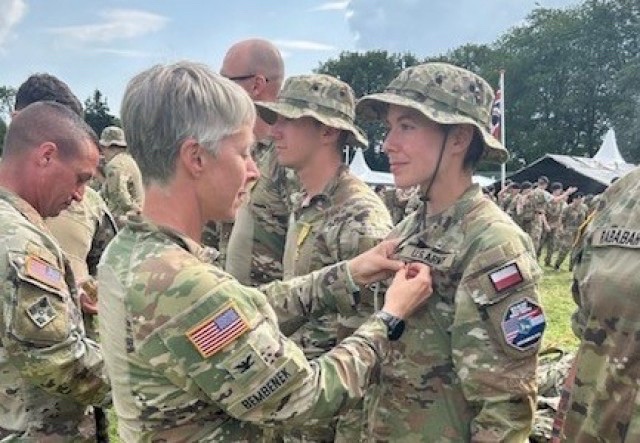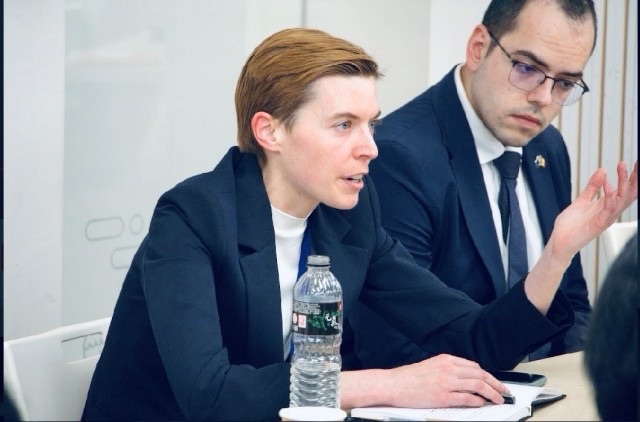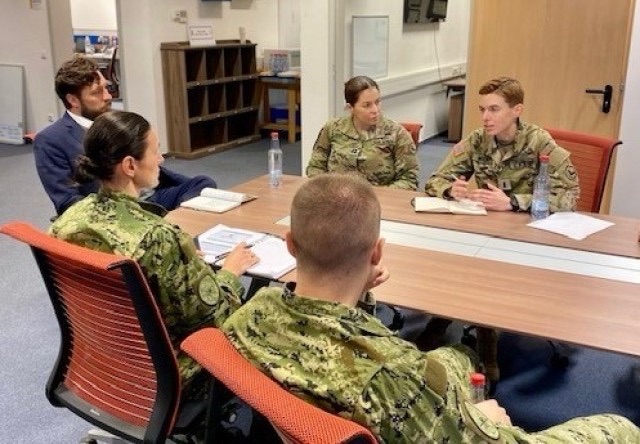
FORT KNOX, Ky. — Bachelor’s, master’s, doctorate, Army.
The only military-related background Capt. Chelsea Michta had prior to becoming the first officer to receive an active-duty direct commission in the Army’s Military Intelligence Corps was that her father worked for the Department of Defense.
Now, she is the officer in charge at the Army Europe Open Source Center – what Michta said is the largest open-source intelligence shop in Europe.
“It’s incredibly meaningful to work with a team who is providing commanders with information that is having a real-world impact on the battlefield,” Michta said. “It’s also humbling to be continuously learning.”
Michta, however, is no stranger to learning. Her achievement becoming the first Army MI direct commission officer is far from her only noteworthy feat. Adorned with extraordinary accomplishments, Michta’s path to the Army was not only unconventional, but shows why her selection was obvious.
“Boy, did she have all of the unique skills that no other lieutenant coming through the regular channels would have,” said Col. Christina Bembenek, 66th Military Intelligence Brigade commander in Wiesbaden, Germany.
Michta’s background and reputation preceded her. After all, how often does a University of Cambridge Ph.D. graduate who speaks English, German, Polish and Spanish commission in the Army? To Bembenek, Michta’s passion for service rivaled that of her passion for academics.
“When she came here, her desire to learn how to be an officer and how to be in the Army was impressive,” Bembenek said. “Her extensive research ability, combined with her knowledge of the languages and region — I could not have had a better officer fall into our brigade.”
Prior to putting on a uniform, much of Michta’s life was devoted to education. While in high school, her father, then professor at a liberal arts college in Memphis, Tennessee, accepted a position with the defense department in Germany. Although she lived in Warsaw as a child, this move provided Michta her first real exposure to Europe and living abroad.

Following her graduation from Munich International School, she went on to earn a bachelor’s in European history from Amherst College and then attended Cambridge for her master’s. There, she was one of just a few graduate students selected by the university to receive a full tuition scholarship to pursue her doctorate.
There was just one issue.
“I knew from the outset that I didn’t want to pursue a traditional civilian academic career,” Michta said. “I didn’t know what I wanted to do with my Ph.D. and explored a number of options during grad school to try and figure that out.”
It was while writing her dissertation that an unexpected set of circumstances ultimately opened Michta’s eyes to the possibility of choosing the Army as a career. When the COVID-19 pandemic hit, she had to return to Germany where her father was serving as the dean of the George C. Marshall Center. With the facility’s classroom the only available workspace outside her home, she spent the days of lockdown with Soldiers attending the Foreign Area Officers’ program there.
“It was honestly that experience of being around a lot of Army officers and talking with them about their experiences in the Army that first sparked my interest in uniformed service,” Michta said.
According to Michta, prior to speaking with FAO Soldiers, who were from various different branches and backgrounds, she admittedly had a fairly simplistic view of the Army. It was through her many conversations that she became both enlightened and inspired.
“I was struck by how diverse their experiences had been and the responsibility that was entrusted to them so early in their career, and by their sense of shared values and purpose,” Michta said. “It was the first time I considered pursuing a career in the military myself, but I just didn’t know what that would look like for me.”
As she began taking steps to see what options were available, Michta discovered the Army was expanding its direct commission opportunities to new specialties. With her combined education, cultural exposure and language capabilities, a panel of senior intelligence officers reviewed her civilian credentials and written statement outlining her desire to serve, and selected Michta to be the first person to direct commission into the MI Corps.
Now, two years after first arriving at Fort Moore, Georgia, Michta is leading her team in Wiesbaden and has her sights set on attending the Captain’s Career Course later this year.

“My short-term goal is to be a company commander and really step into a leadership role,” Michta said. “I want to take what I’ve learned leading my team here in Wiesbaden and apply that to a larger group of men and women and be the best leader that I can be.”
For Michta, the Army was never in the forefront of her mind as a potential career, especially as she traversed the world of academia. She said many people would likely be as surprised as she was that their own personal skillset has that perfect place within the Army’s many avenues.
“I think it’s important to get the word out about what the Army can offer,” Michta said. “If more people were aware of the sheer variety of experiences that a person can have, the shared sense of purpose, and the professional developmental opportunities the Army can offer, I think a lot more people would seriously consider it.
“Don’t write something off just because you’re not familiar with it or you have preconceived notions of what this profession entails. There’s always more to it than you think.”
By Jennifer DeHaan


One more DEI Commie joins the ranks…
So what made you come to that conclusion?
That’s an incoherent and ugly comment based on hate. Shameful and embarrassing.
“Professional Development Opportunities”? That’s your reason for becoming an officer in the US Army. This person has short cutted the system and I am sorry as a veteran of this organization and as citizen of this nation to any young soldier under her(?) leadership who sincerely believes he is defending our constitution. This is just sad.
Direct commission has been around for quite some time and it, in no way, cheapens anyone else’s service. I’m going to take a wild guess, based on your inability to read the article where it clearly states that she is female, that your “concern” is purely based in bigotry and nothing more.
Chris – tell me how you never served without saying you never served.
WTF kind of comment is that?
I came here expecting out of touch brovets and boomers and was not disappointed.
Sometimes, when you find yourself in the overwhelming minority, you’re the one that’s wrong.
They read the words “liberal arts” and just had a meltdown.
I’m a retired Intelligence Officer with a BS in Sociology.
“They” wasn’t aimed at you. It was aimed at the people in this comment section having meltdowns over direct commissions and/or academia, women or liberals. Hence why I joked about the trigger being a father with a liberal arts professor.
I didn’t take it that way. My comment was intended as a point of information for everyone who has lost their minds over this.
Guys, you need to make sure to do some research on her before you comment. Yeah, she’s been in all the policy wonk circles, but among that she’s written on the Warsaw Uprising and done work with the Victims of Communism foundation. It’s fine to distrust, but get it straight instead of going off half cocked.
This just straight-up needs an fn investigation.
I didn’t look into her published stuff like you did (good on you), but I know from spending time in Europe with our allies on miscellaneous joint exercises how much of a value add having an intel officer with her level of historical knowledge alone would be, not to mention the extensive language skills.
I recall us pulling that random PFC from Moldova and the SPC from Ukraine up to BDE to be “drivers” or “RTOs” to have the languages skills and be able to provide more context to our senior leaders as they met with our allied partners.
I’ll say that it’s a lot easier to trust a coincidental PFC ,in some regards, than it is an officer whose whole life has been geared to something . It’s entirely fair to be skeptical .
She’d be far better suited as a civilian in the IC, or a civilian working on Brigade staff or something. Perhaps she has desire and aptitude for doing tactical through operational intelligence and doing actual Army stuff. But I would worry that she thinks she can just jump in and immediately do strategic intelligence with no foundation in tactical or operational.
My big question is if the Army is actually starting to pursue direct commissions for intelligence as a policy. Or if this was just a one-off favor… er, exception to policy.
I saw nothing on the Army recruiting website about offering direct commissions for the MI branch.
Direct commission for intelligence isn’t necessarily wrong. I actually went that path into the Navy Reserve from the Army. The USNR cared much more about breadth and depth of education and experience than the Army. The Army cared more about runtime and being young. My issue is if she is being treated like a special snowflake rather than just happening to be first of a new policy.
Hopefully that’s what she’s getting now and wherever she goes from here it will be an asset. The way she’s talking,she’s expecting and wanting that. Would be a mistake to deprive her of it in the long run.
It’s one thing to say the “right” answer to public affairs, who are righting a story about you. Only her soldiers and peers know the truth. Hopefully she’s a solid soldier and proves that she is worth this special snowflake treatment by the Army.
Can’t argue with that at all.
Direct Commission has been around a long time. However it is also kind of rare and unusual and frequently influenced by corrupt political games.
I have less than zero faith or trust in anyone with a deep entrenchment in the world of academia. I left that path for a reason (several actually).
I certainly hope that she is there as a contributor and not as an infiltrator, however, I am skeptical. Sometimes it is nice to be wrong. I hope this is one of those times.
I retired two years early because of all you accepting and open minded people.
You’ve totally destroyed not only what was an amazing fighting force, but an entire civilisation.
May the children you haven’t aborted live with what you’ve created.
So all those doctors, lawyers, and chaplains the Army has been direct commissioning since 1775 are all pinko Commies, too? And yes, Judge Advocates and Medical Corps direct commissionees can and do command troops.
Except that those are well documented and established programs to attract civilians with specific qualifications needed by the services.
This appears to be a one-off exception to policy. And the Army isn’t hurting for capable officers willing to join the MI branch. What she brings to the table is extremely specific. But MI officers don’t need such specific civilian skills in the way that the the medical corps, JAG, or Chaplains need.
The Army would have better use for her as a civilian working at the COCOM level with EUCOM, or higher. She brings very little extra capability to the table when she has to PCS in three years to Ft Hood or where ever.
If the Army decides to go forward with policy to accept MI direct commissions with established criteria, then great. But as it stands, this reeks of a special favor.
You really don’t want to know how the Army recruited people for Intelligence jobs and the OSS for WWII, then. Sometimes, you do need someone who speaks a language fluently (not 1/1 DLPT), or had lived in certain countries, or in the case of Oh So Social, has certain social contacts and influence. In this CPT’s case, it is her actual language abilities and doctorate level study of areas the Army is concerned about. As a former MI officer, I can say at brigade and below, the Branch Detail re-treads from combat arms to MI made the best S-2s (especially from maneuver combat arms). But, for strategic, human, and some of the other technical Int’s, there was a need for people with big brains that spoke obscure languages fluently, knew about how target countries’ governments and social orders worked, and how complicated intell systems actually functioned. You don’t get that from MIOBC and MIOAC, or whatever they are calling them now. The FAO system was also a complete joke when I was in, it was like if you actually possessed any real knowledge of a country or spoke the language, you were guaranteed not to go there as an FAO.
I get what you’re saying, and I fully understand policies to recruit for special needs. As far as I can tell, this isn’t current policy. This instance is an exception to policy.
However, this is not WWII and we are not standing up an organization like OSS. Which, by the way is an odd point to bring up because that highlights how I mentioned she would be better suited as a civilian. Since the OSS turned into the CIA. In another comment I mentioned “in the IC” as another option.
I also agree about the different mentalities between tactical and strategic intelligence. But as a soldier, she is not going to spend her entire career using her specialties by supporting the EUCOM AOR. She’s going to move around and be just another intelligence officer, so why the special treatment? Again, she would be much more valuable to the Army (and other services) as a GS-13 to GS-15 civilian who could focus on the EUCOM AOR and not have to worry about PCSing every three years. All the uniformed intelligence analysts can still use her finished products in their analysis. That’s why I don’t see a big enough value-add to make an exception to policy just for her.
As I’ve said, if the Army thinks it needs to start doing direct commissions for intelligence the way they’ve needed to for cyber, then make that policy change. Establish criteria and publish the program. But that doesn’t seem to be the case here and I don’t see a big enough value add for an exception to policy. If she REALLY wanted to be a uniformed service member to do intelligence rather than being a civilian in the IC, then she could have gone to OCS.
“She brings very little extra capability to the table when she has to PCS in three years to Ft Hood or where ever.”
When’s 1CD set to replace 3ID in EUCOM? She’ll be useful.
Even then with the AIM marketplace it’s not hard for a person with her level of talent to get a 1-1 for whatever assignment under V Corps or NCR/MDW or even an arbitrary ABCT set for a rotation to Europe.
Regardless of all of that when the Army and DoD is bleeding officers (talented or not) if they have an opportunity to recruit a highly qualified candidate they will. As tax payers isn’t that what we want? The most highly qualified candidate getting accepted instead of someone else less qualified to serve?
If they’re hurting that much for intelligence officers, then they should create a policy for a direct commission path. They should publish the criteria. But they haven’t done that.
Yes, you can make whatever idealist career path that has her continuing to return to Europe. But we both know that wouldn’t be the reality. If there’s a PhD with European knowledge and specialties, the best use is as a civilian so they can have a persistent focus on it and continue to create relevant products. CIA, DIA, at EUCOM, etc. Lots of opportunities.
Col. Bembenek has the time and inclination to write articles about white extremism and Qanon for left-leaning blog “War on the Rocks” and is on staff with left-wing thinktank CNAS. Kudos to her for taking the initiative and helping out a fellow academic who can be a change agent within her organization.
You love posting bait posts like this, always have. Excellent catch today, how you gonna fry em up?
Looking at most comments Im struck how fearful and insecure they are about new future directions for Army.
The many incoherent, paranoid and ugly comments based on hatred are shameful and embarrassing.